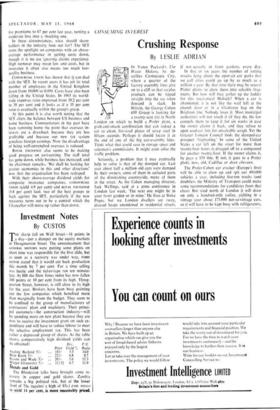Insurance SETback
By JOHN BULL IF it is a hard struggle to make enough profit Ito- cover the cost of your dividend, as most
of the insurance companies find, then Mr Cal- laghan's selective employment tax (SET) is a nasty blow. The Chancellor talks soothingly of
the SET being equivalent to no more than a 3 per cent to 4 per cent purchase tax on the cost of services, or at the most an extra per cent on the cost of living. But it will, for in- stance, add £195,000 to ROYAL EXCHANGE'S ex- penses after tax at a time when it looks to be £800,000 short of covering its payment to share- holders; £240,000 to COMMERCIAL UNION's £1,100,000 gap between earnings and the divi- dend; and £300,000 to ROYAL INSURANCE'S likely shortfall of over £2 million.
In fact, the industry has succeeded in getting its costs down over the past ten years. Progress has been uneven, but the figures are mildly en- couraging. In 1955 expenses absorbed just over 40 per cent of total premium income. Last year the proportion was down to. 37 per cent. So we must look elsewhere for the reason for the fall from grace. The basic causes are these.
Business has expanded quite steadily (by 5 per cent to 10 per cent a year) for a decade and more. That is why the industry qualified for the 'growth' tag and became the darling of the stock markets in the 1950s. But since 1958 claims have taken a growing proportion of premium income. You used to be able to reckon that about 55 per cent of total annual accident, fire and Marine premiums would have to be paid out in any one year. Now the ratio is more like 65 per cent. More cars on the roads, the crime wave, the way firms concentrate enormous values in premises undivided by fire breaks— these are the culprits. And as a result, under- writing profits have been turned into underwriting losses, in many instances on a big scale.
This pattern shows through strongly in the reports for 1965 published this week. In ROYAL EXCHANGE'S biggest department, accident and general insurance, turnover was 73 per cent higher. But claims were a slightly larger propor- tion of premium income and only a good ex- penses performance kept the underwriting loss down to a manageable figure.
Here is where Mr Callaghan's new tax comes in. Reducing costs " is absolutely essential if underwriting accounts are to move out of the red. The SET puts the companies back by about twelve months. And this extra burden is dumped on their backs in the first year of a new cor- poration tax system, which means that dividend costs are 70 per cent higher.
The other escape route is to increase rates and to be more selective about the sort of busi- ness you take on : in essence, what the McKinsey report on motor insurance advocated. Inability to do this is why British companies' American experience has been so bad, hurricane 'Betsy' apart. The trouble in the United States is that the insurance industry needs individual state per- mission to raise rates, and action has been late in coming and often insufficient in scope (though 1965 saw a real improvement on this score). In the UK -rates have been rising, as every householder and car-owner knows. But claims have been increasing with alarming celerity. Fire wastage has trebled over the last seven years and in the first three months of 1966 it was nts further 30 per cent. EAGLE sue, for instance, saw its claims• ratio • jump from- 59 per cent 01
fire premiums to 67 per cent last year, turning a moderate loss into a shocking one.
In these circumstances, what should share- holders in the industry look out for? The SET turns the spotlight on companies with an above- average performance in getting costs down, though it is no use ignoring claims experience. High turnover may mean low unit costs, but in insurance it often also means too much low- quality business.
COMMERCIAL UNION has shown that it can deal with the SET. In recent years it has gOt its total number of employees in the United Kingdom down from 10,000 to 8,000. Costs have also been falling in the United States. In 1965 its world- wide expenses ratio improved from 39.2 per cent to 38 per cent and it looks as if a 35 per cent ratio is eventually within the group's grasp.
At this point it is also worth noting that the SET alters the balance between US business and home business. Commentators in the past have been ramming home the point that overseas in- terests are a drawback because they are less profitable and because our new tax system penalises foreign earnings. Now the disadvantage of being well-entrenched overseas is reduced.
ROYAL EXCHANGE also seems to be making good progress on cost-cutting. The staff total has gone down, while business has increased, and the chairman remarks, We shall be looking for greater economies in this and other directions' now that the organisation has been reshaped.
With their above-average dividend yields for composite insurance companies, COMMERCIAL UNION (yield 4.9 per cent) and ROYAL EXCHANGE OA per cent) look two of the best groups to back against the SET. particularly if the new measures turns out to be a control which the Chancellor will move up rather than down.



































 Previous page
Previous page